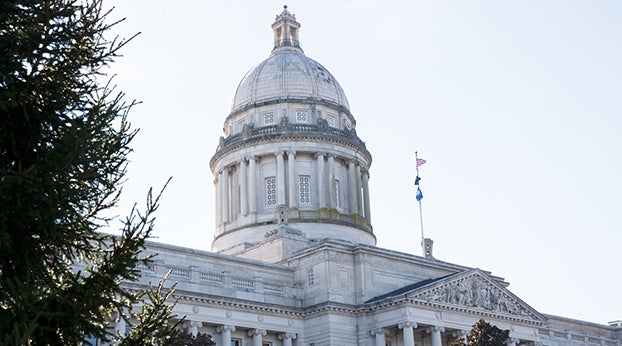Bevin’s new rules shut the people out of ‘The People’s House’
Published 3:08 pm Monday, February 4, 2019
By MARGARET GARDINER
Guest columnist
On the opening day of the General Assembly in January, members of the public who went to Frankfort were suddenly faced with new emergency regulations issued by the Governor restricting their access and use of certain areas of the Capitol.
At first, some were ushered out of the tunnels that link the parking garage and the Annex and the Annex and the Capitol by security guards. Later, others were not even allowed to enter and had to brave the elements outside and do double security checks.
One friend related that she and a companion were ousted from the almost empty third floor of the Capitol by an intimidating plainclothesman.
The Kentucky State Capitol has been known as “The People’s House.” The openness of the Capitol has been of value to all Kentuckians. Ordinary citizens could meet with elected representatives and senators, and observe committee meetings. We could freely rally for the policies that we felt would make Kentucky better. Well, perhaps no longer, if the emergency restrictions, as laid out in KAR/200/003/020E hold.
These emergency regulations, laid out in a mere 4,500 or so words, seem particularly calibrated to discourage civil participation. Greatly concerning is that application and permission must be granted for a “rally” defined as ”four (4) or more visitors for the purpose of actively promoting a cause”. A visitor can bring enough people for a rally in an economy car.
The application procedure requires the application be submitted at least 10 days in advance of the rally. It details the legal obligations of the applicant and the right of the state to revoke the application if there is a need for any public body to use the specific area that the rally has been allowed to use. The group may be charged for use, for damages, etc.
The application cannot be made a year in advance and only one application can be submitted at a time.
The rationale provided for these extensive regulations is “to provide clear and comprehensive guidelines in regard to items and activities that pose a threat to public health, safety, and welfare at state-owned facilities and grounds. Over the years, public interest in, and attendance of, the regular business of the Kentucky Legislature has steadily increased to the extent that concerns have arisen regarding the health, safety, and welfare of visiting members of the public and staff.”
This assertion reflects the perception of a governor who wants complete control over boards and even suggests that the judge, who ruled against the pension law because it was unconstitutionally rammed through the legislature, be circumvented by the legislature in future, even though the higher court supported that judge.
This desire for control uses fear and exaggeration to try to control legitimate opposition. He has branded opponents with epithets like ‘thugs’ and now asserts a threat to public health and safety and the property rights of the state.
This regulation seems very much a governmental overreach in reaction to the protests that brought teachers and other public service employees to the Capitol last year to protest against the administration’s challenge to their contracts by proposed legislation to significantly alter public pensions. They came because they regarded the proposals a danger to their livelihood, to the future of their profession, and indeed to the future of quality public education.
The extent of paranoia that the administration wishes to credit is reflected in the detail prohibitions that it imagines rallying groups might enact, actually specifically prohibiting the use of drones, release of butterflies in buildings, camping in government buildings, wearing masks or hoods (with exceptions for visiting children dressed for Halloween) and on and on.
Yes, we live in an era of polarized political views. We also live at a time when a lot of highly paid lobbyists have significant sway over legislation, including getting special tax relief. Giving access to moneyed interests and not to normal citizens seems a bias inconsistent with democratic values.
Right now, it is vitally important that citizen voices be heard in the corridors of power — individually and in like-minded groups.
The emergency regulations and their use have been somewhat modified since the first day, perhaps influenced by pushback from legal experts and the media. Individuals are now allowed to use the tunnels as long as they don’t congregate, but the regulation leaves the threat of its implementation hanging.
Added was a definition of a spontaneous event. “Spontaneous Event means an event where four (4) or more visitors gather to exercise their First Amendment rights in facilities and on grounds open to the general public in response to a triggering event that has occurred within the preceding calendar week, or is currently occurring.”
Presumably someone reminded the administration of “… the right of the people peaceably to assemble, and to petition the government for a redress of grievances.” But the regulations say nothing further on that topic.
Although this KAR does not specify public comment, another regulation makes it clear that there is a public comment period from now until Feb. 28. You can respond to this regulation and its implementation by writing to Judy Piazza, executive director, Office of Legislative and Intergovernmental Affairs, Finance and Administration Cabinet, Capitol Annex Building Room 392, Frankfort, KY 40601.
The public hearing will be on Feb. 22 from 10 a.m. to noon in room 386 of the Annex. Anyone intending to speak at this hearing must notify Piazza at least five workdays before the hearing. If no one signs up to speak, the hearing may be canceled. Comments can be sent to her email: Judith.Piazza@ky.gov.
Margaret Gardiner is chair of the Boyle County branch of The Women’s Network, an organization that advocates for democratic principles.





